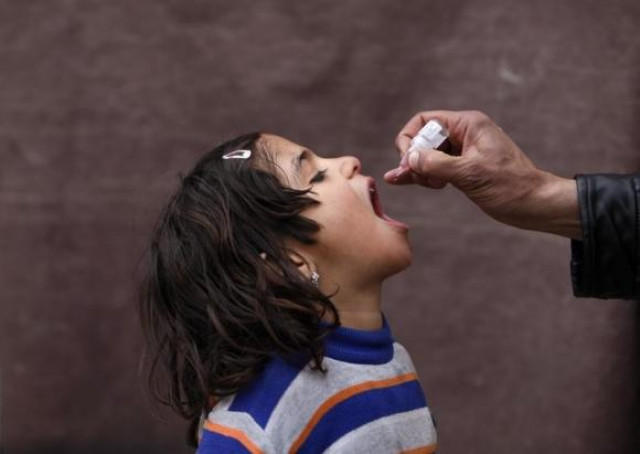Officials fear reemergence of polio
Say district administration has failed to implement recommendations, cooperate with polio teams

PHOTO: REUTERS
“When you are told things under your control should be on the right track and you do not cooperate, then you are responsible for the mess,” a senior official dealing with anti-polio campaigns told The Express Tribune.
The official, who refused to reveal his identity since he was not entitled to speak to media, stated that clear guidelines had been issued and the Technical Advisory Group (TAG) recommendations had been forwarded to the district administration in Peshawar.
The move came after environmental samples consistently tested positive for three consecutive months. However, the polio official said that those responsible for acting on the recommendationas seemed to be ‘least bothered’.
“We are already facing travel restrictions and you cannot [travel internationally] unless you have a polio vaccination card,” the official said as he warned, “we are too close to eradicating this virus, but a non-serious approach could lead to serious consequences.
Earlier in January, a three-day anti-polio campaign was launched in the province where around 5.71million children were due to be vaccinated against the virus. However, the campaign missed 82,210 children. Of these, 20,870 were in Peshawar alone.
Of the 20,870 children missed, parents of 3,665 children had turned vaccinators away.
“I do not have any concern with the 17,000 children who were not available when the polio teams visited their homes, but I wonder what the district administration is doing when you have 3,665 refusal cases under your nose,” the official asked.
A meeting of the TAG Chairman for Polio Eradication Initiative (PEI) held in December last year had set goals for campaigns and had forwarded them to officials concerned working at the emergency operation centres (EOC) across the country where a Northern Corridor Action Plan (NCAP) was also formed and risk factors were identified.
The meeting called for focusing on Peshawar as a major hub for the transmission of the virus from Afghanistan. The meeting had also termed the city a reservoir for the poliovirus with a group still refusing vaccination of their children.
The district administration of Peshawar, though, has refuted the allegations of lack of cooperation.
Peshawar Deputy Commissioner Islam Zeb told The Express Tribune that they had seriously considered the recommendations and were constantly pursuing those parents who had turned away vaccinators.
Zeb explained that there was no uniform reason for parents refusing vaccination, nor were two refusal cases alike. Some refused because their children were terminally ill, others had lost their children due to different diseases but had somehow blamed the anti-polio drops for it. But most had turned away vaccinators due to non-medical or even non-conspiracy issues — most refusals being demand-based [parents demanding power supply, gas, roads].
“We have support from religious people along with local government representatives from villages and neighbourhoods and we will cover every single refusal case,” Zeb told The Express Tribune.
After Peshawar, around 670 refusal cases were reported from Charsadda, 648 from Lakki Marwat, 452 from Swabi, 406 from Nowshera, 373 from Bannu, 166 from Mardan, 68 from Karak, 61 from Mansehra, 39 from Tank, 31 from Haripur, 14 from Hangu, 13 from Dera Ismail Khan, nine from Abbottabad, six from Kohat and five refusal cases were reported from the Malakand district.
Published in The Express Tribune, January 23rd, 2018.













COMMENTS
Comments are moderated and generally will be posted if they are on-topic and not abusive.
For more information, please see our Comments FAQ